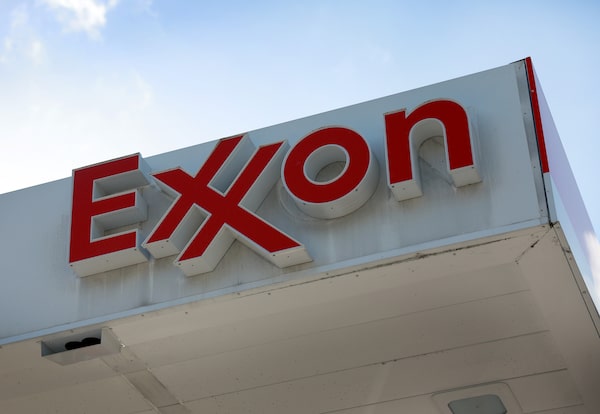
An Exxon gas station in Miami, Fla., on Jan. 31, 2023.Joe Raedle/Getty Images
Exxon Mobil Corp XOM-N on Friday missed analysts’ estimates with a 28 per cent year-on-year drop in first quarter profits as weaker refining margins and lower natural gas prices offset volume gains.
Latest results from oil and gas companies including Chevron CVX-N and TotalEnergies TTE-N reflect a sharp downturn in natural gas prices after a warmer than usual Northern Hemisphere winter cut demand and pushed up inventories.
Exxon, which is in the process of closing a $60-billion deal for top shale oil producer Pioneer Natural Resources, posted lower first-quarter earnings of $8.22-billion, down from an $11.43-billion net profit a year ago.
The stock was down 1.8 per cent in pre-market trading at $119.25 after reporting a profit per share of $2.06, 6 per cent shy of Wall Street analysts’ consensus for $2.20 per share, LSEG estimates showed.
Earnings from oil and gas production fell 14 per cent on lower natural gas prices and refining tumbled 67 per cent on weaker fuel margins, mark-to-market derivatives, and higher maintenance costs. Its chemicals business, however, was a standout, with earnings more than doubling on lower input costs and higher margins, the company said.
Earnings of $8.22-billion for the first quarter ended March 31 were off 29 per cent compared to adjusted profit of $11.62-billion a year earlier.
But the results were the second highest for a first quarter in the past decade, behind the year-ago period, said Chief Financial Officer Kathryn Mikells. The miss was due in part to tax and inventory balance sheet adjustments, she said.
“Every quarter, we have some pluses and minuses associated with these one-off items”, she said. “Sometimes they are favourable, this time they were unfavourable.”
Global oil prices were largely flat against a year ago while the company received a price for its natural gas that was 32 per cent less than a year ago, the company said.
Oil and gas results were boosted by lower costs and higher volumes from Exxon’s Guyana operations, where the latest production vessel hit full production earlier than expected. Hess HES-N, one of Exxon’s partners in the South American country, earlier flagged the increase with a 70 per cent year-over-year output gain.
“Oil volumes outpaced the street, driven by surging production in Guyana, where gross production reached a record 600,000 barrels per day,” said Peter McNalley, an analyst at Third Bridge.
Exxon’s capital spending last quarter was the lowest in seven quarters and its streamlining of operations expanded what it calls structural cost savings by $400-million.
It added $1.7-billion in cash last quarter to end the period with $33.3-billion.
Exxon’s acquisition of Pioneer is expected to wrap up in coming weeks. Exxon has started the integration process with a team working separately from the business, Mikells said.
“We are feeling really good about our interactions with the Pioneer people and making sure that we put our best foot forward as we close this transaction,” she said.
The all-stock deal for Pioneer would make Exxon the largest oil and gas producer in the top U.S. shale field, doubling output there to more than 1.3 million barrels of oil equivalent per day. Exxon forecasts the combination will allow it to reach 2 million barrels per day in 2027.
That deal was the largest among a series of blockbuster combinations in recent years, as wildcatters including Pioneer, Endeavor Energy and CrownRock were acquired by bigger companies which sought to lock in years of future production and achieve economies of scale from expanded operations.
Pioneer’s shares this week traded at $275 apiece, a 9 per cent increase to their October deal value.
Exxon is in a dispute with Chevron and Hess over assets in Guyana, home to the biggest oil finds in the past two decades. In face of Chevron’s $53-billion offer for Hess, Exxon has claimed pre-emption rights over Hess’ Guyana assets. That claim is being considered by an international arbitration panel.
Hess’ 30 per cent stake in the Guyana joint venture is the prize in Chevron’s proposed takeover.
Mikells said Exxon and partner CNOOC Ltd will “evaluate our options” if the arbitration panel agrees that they have the first of first refusal to a sale.
“It is all about clarifying our contractual rights, period,” she said.